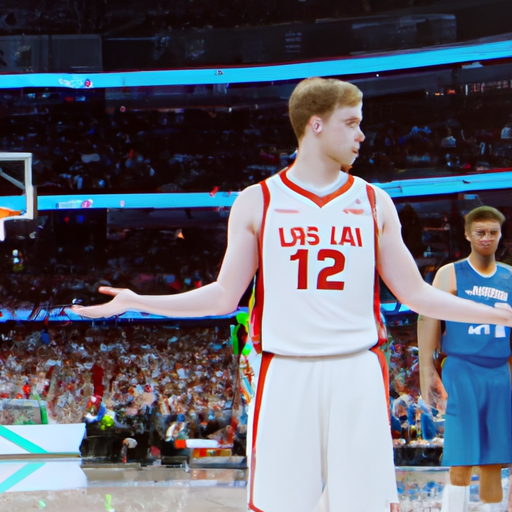‘Not fair’: Luka Doncic decries officiating as Canada imposes physical defense in QF win

Luka Doncic’s Criticism of Officiating in QF Game
Luka Doncic, the Slovenian basketball prodigy, expressed his frustration with the officiating in the quarterfinal game against Canada. The game was marked by physical defense from the Canadian team, which seemed to test the boundaries of what was considered fair play. Doncic, known for his exceptional skills and ability to draw fouls, found himself on the receiving end of aggressive defense throughout the match.
As the game unfolded, it became evident that Canada had adopted a strategy of physicality to disrupt Doncic’s rhythm. The Canadian defenders were relentless in their pursuit of the Slovenian star, often resorting to grabbing, pushing, and even tripping him in an attempt to throw him off balance. Doncic, who is no stranger to physical play, found himself frustrated by the lack of calls from the officials.
In post-game interviews, Doncic did not hold back in expressing his disappointment with the officiating. He felt that the referees had failed to protect him from the excessive physicality displayed by the Canadian team. Doncic argued that such aggressive defense not only hindered his ability to perform at his best but also posed a risk of injury.
Doncic’s criticism of the officiating is not without merit. Basketball, like any other sport, relies on the officials to enforce the rules and ensure fair play. When players resort to overly physical tactics, it is the responsibility of the referees to step in and maintain control of the game. In this particular match, it appeared that the officials were either unwilling or unable to do so.
The issue of officiating in basketball is not a new one. Throughout the history of the sport, players and coaches have often voiced their frustrations with inconsistent or biased calls. However, in recent years, there has been a growing concern about the increasing physicality in the game and the lack of protection for star players.
Doncic’s criticism of the officiating in the quarterfinal game against Canada highlights a larger issue within the sport. As basketball becomes more physical, it is crucial for the officials to adapt and ensure that the rules are enforced consistently. Failure to do so not only compromises the integrity of the game but also puts players at risk of injury.
It is worth noting that Doncic’s frustration with the officiating is not solely based on his personal experience. Many fans and analysts have also expressed their concerns about the physicality displayed by teams in international competitions. The lack of consistent enforcement of the rules not only affects the outcome of individual games but also has broader implications for the sport as a whole.
In conclusion, Luka Doncic’s criticism of the officiating in the quarterfinal game against Canada sheds light on a larger issue within basketball. The increasing physicality in the sport calls for a more proactive approach from the officials to ensure fair play and protect the players. Failure to address this issue not only compromises the integrity of the game but also puts players at risk. It is essential for basketball’s governing bodies to take note of these concerns and work towards creating a safer and more balanced playing environment.
Canada’s Physical Defense in QF Win

Canada’s Physical Defense in QF Win
In a highly anticipated quarterfinal matchup between Slovenia and Canada at the Tokyo Olympics, the Canadian team showcased a physical defensive strategy that left Slovenian star Luka Doncic frustrated and decrying the officiating. The game was a battle of two talented teams, but it was Canada’s aggressive defense that ultimately proved to be the difference-maker.
From the opening tip-off, it was clear that Canada had come prepared to impose their physicality on the Slovenian team. They were determined to disrupt Slovenia’s offensive flow and make life difficult for Doncic, who had been a dominant force throughout the tournament. The Canadian players were relentless in their pursuit of the ball, constantly applying pressure and denying easy passing lanes.
One of the key aspects of Canada’s defensive strategy was their ability to effectively switch defenders on Doncic. They threw multiple defenders at him, making it challenging for him to find open teammates or create scoring opportunities for himself. This constant harassment forced Doncic into difficult shots and turnovers, disrupting Slovenia’s offensive rhythm.
Canada’s physicality was not limited to guarding Doncic alone. They also made their presence felt in the paint, challenging every shot and contesting rebounds with great intensity. The Canadian big men were not afraid to use their size and strength to their advantage, often forcing Slovenia’s players into tough shots or altering their shot attempts.
The physicality of Canada’s defense was not without controversy, however. Luka Doncic, frustrated by the constant contact and what he perceived as unfair officiating, voiced his displeasure after the game. He argued that the referees allowed Canada to play overly physical and that it affected the outcome of the game. Doncic’s frustration was evident, as he felt that his team was not given a fair chance to compete.
While Doncic’s complaints may have some merit, it is important to note that physical defense is a legitimate strategy in basketball. Teams often employ aggressive tactics to disrupt their opponents’ offensive flow and gain an advantage. Canada’s approach was within the rules of the game, and they executed it effectively to secure the victory.
It is also worth mentioning that Slovenia had their fair share of physical plays throughout the game. They were not passive victims of Canada’s aggression but actively engaged in physical battles on both ends of the court. Basketball is a physical sport, and teams must be prepared to withstand and respond to physicality from their opponents.
In the end, Canada’s physical defense proved to be the deciding factor in their quarterfinal win against Slovenia. Their relentless pressure and ability to disrupt Doncic’s game were instrumental in neutralizing Slovenia’s offensive firepower. While Doncic may feel aggrieved by the officiating, it is important to recognize that Canada’s victory was a result of their effective execution of a legitimate defensive strategy.
As the tournament progresses, it will be interesting to see how teams adjust to Canada’s physicality and whether it continues to be a successful approach. The Olympic stage is known for showcasing the best basketball talent from around the world, and teams must be prepared to face a variety of defensive strategies. Canada’s physical defense in the quarterfinals was a testament to their determination and willingness to do whatever it takes to secure victory.
The Perception of Fairness in Basketball Officiating
Basketball is a game that has captivated fans around the world for decades. Its fast-paced nature, skillful plays, and intense competition make it a thrilling sport to watch. However, one aspect of the game that has always been a topic of debate is the officiating. The perception of fairness in basketball officiating is a crucial factor that can greatly impact the outcome of a game. Recently, this issue came to the forefront when Luka Doncic, the star player for Slovenia, decried the officiating in a quarterfinal match against Canada.
In the highly anticipated matchup between Slovenia and Canada, both teams were vying for a spot in the semifinals of the basketball tournament. As the game unfolded, it became evident that Canada was employing a physical defense to contain Doncic, who is known for his exceptional skills and ability to score at will. The Canadian players were using their size and strength to disrupt Doncic’s rhythm and limit his impact on the game.
Doncic, frustrated by the physicality of the Canadian defense, voiced his concerns about the officiating. He believed that the referees were not calling fouls when he was being aggressively defended, which he felt was unfair. Doncic’s comments sparked a heated discussion about the perception of fairness in basketball officiating.
The perception of fairness in basketball officiating is a complex issue that is influenced by various factors. One of the main challenges for referees is striking a balance between allowing physical play and ensuring player safety. Basketball is a contact sport, and some level of physicality is expected. However, when the line between physical play and fouls becomes blurred, it can lead to frustration and complaints from players and coaches.
Another factor that affects the perception of fairness in officiating is the consistency of calls. Players and coaches often argue that referees should call the game consistently throughout, regardless of the situation or the players involved. Inconsistency in officiating can create confusion and frustration among players, as they may feel that they are being treated unfairly compared to their opponents.
Furthermore, the perception of fairness in basketball officiating is also influenced by the reputation and star power of the players involved. Superstar players like Luka Doncic often face more physical defense from opponents, as teams try to disrupt their rhythm and limit their impact on the game. In such cases, players may feel that they are not receiving the same level of protection from the referees, leading to a sense of unfairness.
It is important to note that officiating is a challenging task that requires split-second decision-making. Referees have to make judgment calls in real-time, often under intense pressure. They are human and prone to errors, which can further fuel the perception of unfairness. However, it is crucial to remember that referees undergo extensive training and are constantly evaluated to ensure the highest level of officiating.
In conclusion, the perception of fairness in basketball officiating is a complex issue that can greatly impact the outcome of a game. The recent comments by Luka Doncic regarding the officiating in the Slovenia vs. Canada quarterfinal match have once again brought this issue to the forefront. Factors such as the balance between physical play and player safety, consistency in calls, and the reputation of players all contribute to the perception of fairness. While officiating errors can occur, it is important to recognize the challenges faced by referees and the efforts made to ensure the highest level of officiating in the game of basketball.

